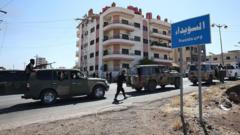Venezuela is investigating claims of systematic torture described by its Attorney General, following the repatriation of over 250 migrants who endured alleged human rights abuses in an El Salvador prison.
**Venezuela Launches Inquiry into Alleged Torture of Migrants in El Salvador**

**Venezuela Launches Inquiry into Alleged Torture of Migrants in El Salvador**
Venezuelan authorities investigate human rights violations faced by deported migrants after their months in a notorious prison.
More than 250 Venezuelan migrants, repatriated to Venezuela on Friday, are at the center of serious allegations regarding their treatment during a four-month detention in El Salvador's infamous Terrorism Confinement Center, known as CECOT. The detainees had been sent there after deportation from the United States in March, under provisions of the 1798 Alien Enemies Act.
Venezuelan Attorney General Tarek William Saab announced the commencement of an investigation into claims that the migrants endured "systematic torture," which purportedly included sexual abuse, daily beatings, and deplorable food conditions. During a recent press conference, Saab shared testimonies and images suggesting serious injuries among the detainees, including bruises and missing teeth. However, these allegations have yet to be independently confirmed.
El Salvador's leadership, including President Nayib Bukele, Justice Minister Gustavo Villatoro, and Head of Prisons Osiris Luna Meza, are being investigated in connection to these claims, with Saab calling for the International Criminal Court (ICC) and the United Nations Human Rights Council to take similar action. Interestingly, Venezuela itself is being scrutinized by the ICC for accusations of torturing prisoners.
The deported Venezuelans were branded as gang members, a claim that many of their relatives and lawyers contest. These individuals faced severe restrictions in CECOT, lacking access to legal representation and contact with loved ones. Public outrage surged when images released by Bukele's administration depicted the detainees in handcuffs and with shaved heads.
After their release in mid-July — part of a deal involving US nationals held in Venezuela — the US government expressed gratitude to Bukele for facilitating the exchange. In the context of US-Venezuela relations, heavy economic sanctions imposed by the US on Venezuela remained a contentious issue, with discussions around the potential revocation of Temporary Protected Status for Venezuelans gaining traction after a ruling from the US Supreme Court in May.






















